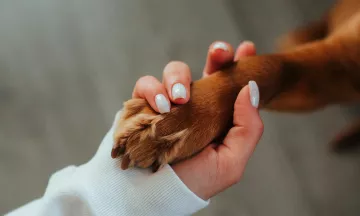Despite the pristine litter box that you set up for your cat, there might be the odd mishap around the house. Why would a cat pee outside their litter box, and how can you get your cat back to a good toilet routine? Here are 7 tips.
What are the causes for a cat to NOT use their litter box?
- Pain when urinating /medical reasons
- Wrong kind of cat litter
- The litter box is not clean enough
- The litter box is open/closed OR has/hasn't got a door
- Your cat is marking around the house
- Other cats use the litter box
- The litter box is in the wrong place/too close to food or water
1. Pain when urinating / other medical reasons
Start by ruling out any medical cause for this behaviour. Cats with bladder and urinary tract problems will have trouble urinating and may also pee in various random places around the house. Bladder problems are often not clearly noticeable at first glance, but they can lead to serious (fatal) problems when left untreated. Older cats can also spray or soil around the house all of a sudden due to health issues. Always consult your vet to exclude any medical problems.
A pet owner tip: keep your cat's urinary tract healthy, by providing quality food that is preferably wet. Here are some tips to encourage your cat to drink more water.
2. You're using the wrong litter
Cats can be very picky when it comes to litter. Have you recently changed the type you purchase for your cat? If your cat hesitates to step onto the litter box, stands with its paws right on the edge of the box or doesn't like to dig into the pellets, this is an indication that the litter is uncomfortable. Some litters are just too harsh for delicate cat paws!
Shop around and try to find out which cat litter your cat likes best. It's also best to choose an unscented cat litter and avoid scented litter sprays. So-called 'fresh' perfumed scents might be nice for people but are not pleasant for cats.
3. The litter box isn't clean enough
Cats are very hygienic animals. When their toilet is not clean, they won't use it! So scoop your cat's litter every day and regularly clean the entire litter box thoroughly. Preferably use odourless, biodegradable cleaning products.
Please note: not all cat litter is biodegradable, so think twice before throwing it into the toilet. In the case of non-organic litter, put the used litter into regular household waste.

4. The container has or does not have a cover or flap
Some cats really like a closed litter box because they are nicely sheltered there. But more often cats prefer an open box without a roof. The closed litter boxes are mainly made for people so that we don't have to look in their toilet.
Many cats prefer to keep an eye on the environment while urinating and therefore prefer an open container. A flap/door also causes confusion for many cats. So carefully observe and consider which type of container is the most comfortable for your cat.
5. Litter box in the wrong place
Just like people, cats like to go to the bathroom in a quiet, private place. So make sure that the container is not in a busy passage, but in a quiet corner of the house. Also keeps food, drinks and the litter box very separate. Cats do not like to eat, drink and urinate in the same area.
6. Multiple cats on a toilet
Do you have several cats? Then the 'litter box system' can become a tricky issue. Cats don't like to use a litter box where other cats go too. If there are too few litter boxes, a territorial struggle can arise, resulting in peeing outside the box. So put enough litter boxes around so that each cat has it's own.
7. Marking
Young male and female cats that are of breeding age can suddenly urinate around the house. Marking with urine is a cat's way of defining their territory. 'Spraying' behaviour from male cats can be particularly smelly and quite annoying, and can often be solved by desexing.
But beware: marking urine can also be a sign of stress, anxiety, boredom or depression. So observe your cat closely to determine what might be causing stress. Cats can get stressed out by changes in the household such as renovation, relocation, new roommate or a new pet, or living somewhere with too little living space per cat. Read more about how to make a cat happy and relaxed.
Extra tips:
Does your cat sometimes pee outside the litter box? Clean it up immediately with soda or organic cleaning agents. The scent of urine lingering can encourage a cat to pee outside the litter box again.
Did your cat ever soil the house and what has worked for you to make her stop? Share your tips with us and the whole Pawshake community.
Finally: never, ever punish your cat for peeing somewhere it isn't meant to. A cat never pees or poops outside the box because of disobedience - cats prefer to pee in their own litter box! Therefore always try to find out the underlying, so that your cat will soon be able to pee where it's supposed to in peace :-) For more helpful tips on the topic watch this.





